【最新】外研版八年级英语上册《Module10 Unit3 Language in use》导学案
最新外研版八年级上册英语精品教案:-Module 10 Unit 3教案
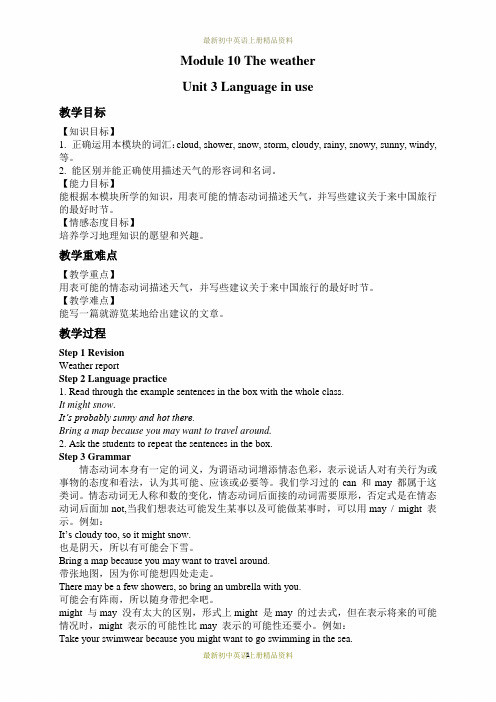
Module 10 The weatherUnit 3 Language in use教学目标【知识目标】1. 正确运用本模块的词汇:cloud, shower, snow, storm, cloudy, rainy, snowy, sunny, windy,等。
2. 能区别并能正确使用描述天气的形容词和名词。
【能力目标】能根据本模块所学的知识,用表可能的情态动词描述天气,并写些建议关于来中国旅行的最好时节。
【情感态度目标】培养学习地理知识的愿望和兴趣。
教学重难点【教学重点】用表可能的情态动词描述天气,并写些建议关于来中国旅行的最好时节。
【教学难点】能写一篇就游览某地给出建议的文章。
教学过程Step 1 RevisionWeather reportStep 2 Language practice1. Read through the example sentences in the box with the whole class.It might snow.It’s probably sunny and hot there.Bring a map because you may want to travel around.2. Ask the students to repeat the sentences in the box.Step 3 Grammar情态动词本身有一定的词义,为谓语动词增添情态色彩,表示说话人对有关行为或事物的态度和看法,认为其可能、应该或必要等。
我们学习过的can 和may 都属于这类词。
情态动词无人称和数的变化,情态动词后面接的动词需要原形,否定式是在情态动词后面加not,当我们想表达可能发生某事以及可能做某事时,可以用may / might 表示。
例如:It’s cloudy too, so it might snow.也是阴天,所以有可能会下雪。
Bring a map because you may want to travel around.带张地图,因为你可能想四处走走。
外研版八年级英语上册 Module 10 Unit 3 Language in use.考点习
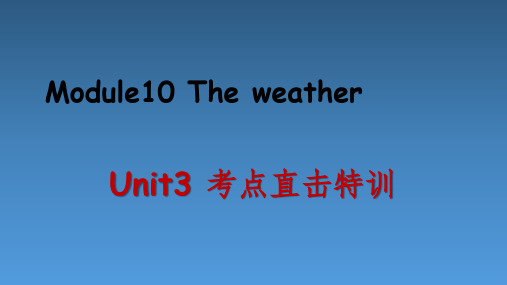
5. 他们可能九点半到这里。 They _w_i_ll_ _p_ro_b_a_b_ly_get here at half past nine.
It _m__ay__b_e_/is__p_ro_b_a_b_ly__cold and wet in London in winter. 2. 下周我可能坐飞机去上海。
Next week, I _w_i_ll_ _p_r_o_b_a_bl_y_fly to Shanghai.
考点直击
3. 明天最低温度可能是零下 15 度。 The lowest temperature tomorrow _m_a_y_/m__ig_h_t_ be minus fifteen degrees.
考点直击
2. ① _D__ he grows older, he knows how hard his parents work for
his family.
A. While B. Because C. If
D. As
② We often _A__ the volunteer organizations to help others
模块专题聚焦
Ⅰ.单项选择
1. In competitions, as in life, you __B__ not always win.
A. shall B. may
C. must
D. need
2. 【泉州中考】—What’s wrong with Judy?She has been absent
4. 【莱芜中考】Life is changeable. No one knows what __D__ happen in the future. A. should B. need C. have to D. might
外研版八年级英语上册Module 10 unit3 Language in use.教案

AR 设备,白板设备、PPT 课件、学生预学案、学生学案、微课
技术准备:课前为五个小组的学生准备五段不同的天气预报视频,让学生通过扫描地图获取视频; 在引入模块任务环节通过语音对话的形式引入话题;课前微课的录制,给予学生必要的背景知识。
学习目标(内容框架)
通过本课学习,学生能够: 1、(知识与技能):对照天气示意图,听懂天气预报;能够谈论、描述天气情况;能够 就游览某地给出最佳的旅游时间和相关建议,并使用 because,so,but 等说明原因和 结论。 2、(过程与方法):通过小组间的竞争和组内合作,培养学生合作学习的意识,提高学 生解决实际问题的能力。
同时,在教育部落实关于全面深化课程改革的一系列文件中,“核心素养”这个名词的提出, 再一次明确学生应具备的适应终身发展和社会发展学要的必备品格和关键能力,突出强调个人修养、 社会关爱、家国情怀,更加注重自主发展、合作参与、创新实践。教师通过培养学生信息,人文, 专业等方面的素养,从而达到立德树人的目。
2011 版《义务教育英语课程标准》中还指出现代外语教育注重语言学习的过程,强调语言学习 的实践性,主张学生在语境中接触、体验和理解真实语言,并在此基础上学习和运用语言。鼓励学 生在教师的指导下,通过体验、实践、参与、探究和合作等方式发现语言规律,逐步掌握语言知识 和技能,不断调整情感态度,形成有效的学习策略,发展自主学习能力。
the 式,为后面运
different cities. 3. Ask the student to
symbols
of
weather on the
map and choose
用语言的活 动奠定基础。
rearrange the symbols of
外研版八年级英语上册教案:Module10Unit3Languageinuse
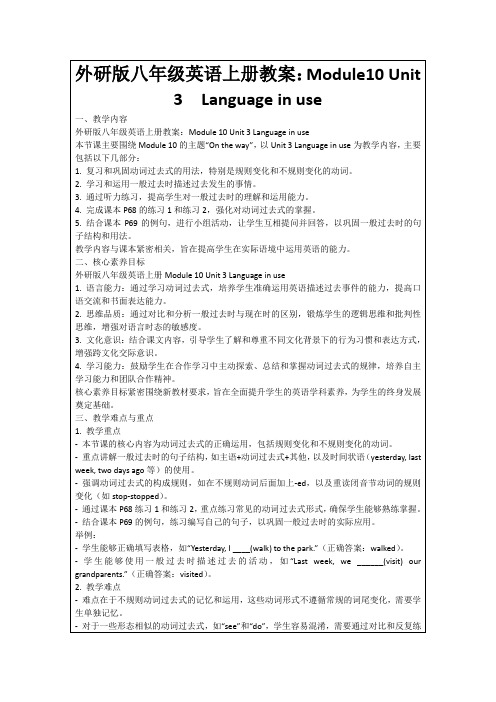
4.学习能力:鼓励学生在合作学习中主动探索、总结和掌握动词过去式的规律,培养自主学习能力和团队合作精神。
核心素养目标紧密围绕新教材要求,旨在全面提升学生的英语学科素养,为学生的终身发展奠定基础。
三、教学难点与重点
-通过课本P68练习1和练习2,重点练习常见的动词过去式形式,确保学生能够熟练掌握。
-结合课本P69的例句,练习编写自己的句子,以巩固一般过去时的实际应用。
举例:
-学生能够正确填写表格,如“Yesterday, I ____(walk) to the park.”(正确答案:walked)。
-学生能够使用一般过去时描述过去的活动,如“Last week, we ______(visit) our grandparents.”(正确答案:visited)。
课堂上,我尝试通过提问和案例分析的方式引导学生主动思考,这样的互动让学生们更积极地参与到学习中。例如,在讲解动词过去式时,我让学生们尝试造句,并及时给予反馈,帮助他们纠正错误,加深理解。
然而,我也注意到,部分学生在口语练习时仍然显得有些拘谨,可能是因为他们对过去时的运用还不够自信。在未来的教学中,我需要更多地关注这部分学生,鼓励他们大胆开口,增强他们的自信心。
此外,小组讨论环节,学生们表现得相当积极,能够围绕一般过去时的应用进行深入的探讨。但在成果分享时,我发现有些小组的展示还不够充分,可能是由于讨论时间分配不均或是对主题理解不够透彻。为此,我计划在下次活动中,更加明确讨论要求,并在讨论过程中给予适当的指导,以提高讨论效率。
在实践活动方面,写作练习让学生们能够将所学的知识应用到实际情境中,但我也发现有些学生在构思句子时仍存在困难。针对这一问题,我打算在接下来的课程中增加一些写作技巧的讲解,如如何运用时间状语、如何连接句子等,帮助学生提升写作能力。
Module10Unit3Languageinuse教案-2020年秋外研版八年级英语上册
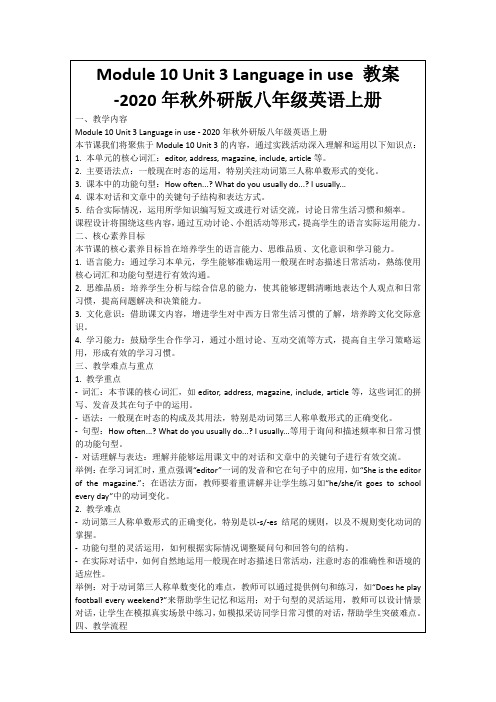
2.引导与启发:在讨论过程中,我将作为一个引导者,帮助学生发现问题、分析问题并解决问题。我会提出一些开放性的问题来启发他们的思考。
3.成果分享:每个小组将选择一名代表来分享他们的讨论成果。这些成果将被记录在黑板上或投影仪上,以便全班都能看到。
1.本单元的核心词汇:editor, address, magazine, include, article等。
2.主要语法点:一般现在时态的运用,特别关注动词第三人称单数形式的变化。
3.课本中的功能句型:How often...? What do you usually do...? I usually...
2.教学难点
-动词第三人称单数形式的正确变化,特别是以-s/-es结尾的规则,以及不规则变化动词的掌握。
-功能句型的灵活运用,如何根据实际情况调整疑问句和回答句的结构。
-在实际对话中,如何自然地运用一般现在时态描述日常活动,注意时态的准确性和语境的适应性。
举例:对于动词第三人称单数变化的难点,教师可以通过提供例句和练习,如“Does he play football every weekend?”来帮助学生记忆和运用;对于句型的灵活运用,教师可以设计情景对话,让学生在模拟真实场景中练习,如模拟采访同学日常习惯的对话,帮助学生突破难点。
在学生小组讨论后,成果分享环节进行得相对顺利。学生们能够较好地展示他们的学习成果,但我也发现部分学生对于同伴的评价和建议不够重视。针对这一点,我认为在以后的课堂中,应该加强对学生互评环节的引导,培养他们倾听、尊重和采纳他人意见的习惯。
-对话理解与表达:理解并能够运用课文中的对话和文章中的关键句子进行有效交流。
外研版英语八年级(上)M10 Unit 3 Language in use-教案

教学设计外语教学与研究出版社《新标准》英语初中二年级上册Module Ten The weatherUnit Three It might snow.辽宁省大连市第三十九中学一、教材分析“天气”这个话题与人们的生活息息相关,是西方人特别是英国人在日常生活中经常谈论的。
本模块的内容由天气扩展到去一个地方旅游的最佳时间等内容,与学生的生活联系紧密。
模块分设三个课时进行学习,本节课是这个模块中的第三课时,是一节综合语用课。
本模块的任务为就到中国旅游的最佳时间提出建议,给朋友回复邮件。
本单元的重点是能够正确运用表示可能性的单词和句型描述天气。
难点为选择最佳时间来中国游玩并提出建议,使语言知识的学习融入生活实践,培养用语言做事的能力。
二、学情分析本课授课对象是八年级学生,他们活泼好动,有着丰富的想象力和好奇心,并且在本模块前两个单元的学习中已经积累了有关天气的词汇、询问并描述天气的句型以及表达可能性的词汇和语法内容。
有进一步学习的欲望,愿意通过小组合作学习的方式共同完成模块任务。
三、教学目标(一)语言知识目标1.复习词汇:cloud, cloudy, rain, rainy, sun, sunny, snow, snowy, wind, windy, storm, shower, minus, temperature, degree2. 语法:may, might, will probably 表可能性(二)技能目标1. 能够运用表达可能性的词汇和句型谈论、描述天气情况2. 能够就游览某地给出建议,并使用because ,so, but等说明原因和结论3. 能够帮助外国友人选择来中国游玩的最佳时间、陈述理由并给出相关的建议。
(三)学习策略目标1. 自学策略:能够理解并归纳表示可能性的单词和句型;掌握谈论天气情况的习惯表达方式。
2. 合作学习策略:能够在同学间积极运用所学英语就不同的天气情况进行表达和交流,选取到中国游玩的最佳时间并给出合理建议。
外研版八年级英语上册教案 Moddule 10 Unit 3-2
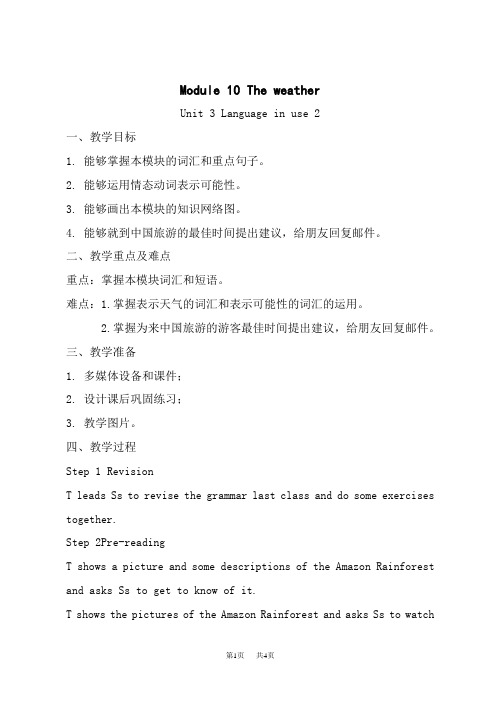
Module 10 The weatherUnit 3 Language in use 2一、教学目标1. 能够掌握本模块的词汇和重点句子。
2. 能够运用情态动词表示可能性。
3. 能够画出本模块的知识网络图。
4. 能够就到中国旅游的最佳时间提出建议,给朋友回复邮件。
二、教学重点及难点重点:掌握本模块词汇和短语。
难点:1.掌握表示天气的词汇和表示可能性的词汇的运用。
2.掌握为来中国旅游的游客最佳时间提出建议,给朋友回复邮件。
三、教学准备1. 多媒体设备和课件;2. 设计课后巩固练习;3. 教学图片。
四、教学过程Step 1 RevisionT leads Ss to revise the grammar last class and do some exercises together.Step 2Pre-readingT shows a picture and some descriptions of the Amazon Rainforest and asks Ss to get to know of it.T shows the pictures of the Amazon Rainforest and asks Ss to watchand learn.T and Ss learn the background knowledge of the Amazon Rainforest together.【设计意图】通过展示亚马逊热带雨林的图片,让学生对其产生感性认识,然后为学生讲解亚马逊热带雨林的背景知识,帮助他们了解亚马逊热带雨林,引起学生的兴趣,导入新课。
Step 3 While-readingT and Ss read the passage together and learn some knowledge of the Amazon Rainforest.After learning, T asks Ss to do some exercises related to their reading. Then the class check out their answers together.【设计意图】通过阅读课本上关于亚马逊热带雨林的英文介绍并完成填空题,锻炼学生在阅读过程中提取关键信息的能力。
外研版八年级上M10_U3教案

My parents offered to take us there.
My parents agreed to take us.
We decided to stay for two hours.
I hope to understand more next time.
教学目标
语言知识目标:
1. Words & phrases生词和短语
full, silver, enjoyable, performance
2. Key sentences重点句子
She wanted to see some Beijing Opera.
My parents offered to take us there.
New words:
full,
silver,
enjoyable,
performance
教学反思或案例设计
检查意见
检查人
时 间
expressions in the box.
Check the answers by
themselves first, then go through the answers with the students.
In this procedure, revise the important grammar points of this module. Do pair work to practise verbs followed by infinitives.
S1: The food here is excellent.
S2: It’s delicious.
外研版八年级英语上册Module10 Unit3 Language in use课件

Qatar’s land is mainly a low, flat desert. The weather is hot during the summer and warm during the rest of the year. Little rain falls. Sandstorms are common.
Qatar is a small country in the Middle East. The capital of Qatar is Doha. Qatar has an area of about 11,500 square kilometers. The whole country is smaller than Beijing. Although it is a small country, it's very rich. Why is it rich? That’s because it has a lot of oil and natural gas.
Module 10 The weather
Unit 3 Language in use
基础过关全练
Ⅰ.单项选择
1.(人与自我·学校生活)(2023黑龙江绥化中考)Boys and girls,
good luck and wish you C good grades in a new year.
A.get
A.can
B.must
C.need
D.might
解析 根据答语中的“但是我不确定”可知,她可能去图书 馆,might表示语气不太确定的推测,意为“可能;也许”,符合 题意。
3.(2023辽宁本溪、辽阳、葫芦岛中考)I tried to buy the dictionary in two bookstores, but C of them had it.
八年级英语上册 Module 10 Unit 3 Language in use课件 (新版)外研版

1 It is sunny now, but let’s take an umbrella…(rain later) 2 It is not always warm in February, and…(cool)
because it might/may/will probably rain later. 2. It is not always warm in February, and
sometime it may/might be very cold. 3.It is usually hot and sunny, so we
D. must enjoy 4.-Excuse me. Is this the right way to the Summer
Palace? -Sorry, I am not sure. But it ___ be. A. might B. will C. must D. can
第六页,共29页。
Language practice
morning, but the sun will come out in the afternoon.
第二十页,共29页。
Around the world
The Amazon Rainforest
The Amazon Rainforest is one of the wettest places in the world. It has more than 200 cm of rain every year. The Amazon Rainforest has more different animals and plants than any other place in
Module10Unit3Languageinuse课件英语八年级上册

1. What is the name of the writer's home town? _I_t_'_s_S_a_n_y_a__C_i_ty_._/_S_a_n_y_a__C_i_ty_.____________________________________ 2. How can we visit the beaches? _W__e_c_a_n__v_is_i_t _th__e_b_e_a_c_h_e_s_b_y__c_a_r_o_r_b_y__b_o_a_t_. _/B__y_c_a_r_o_r__b_y_b_o_a_t_.________
四、读写综合。 A. 阅读短文,回答问题。
My home town is Sanya City. It is in the south of Hainan Island. It has a population of about 700,000. The weather here is warm and sunny all year round, so you can visit it any time you like.
表示允许
might表示的语气较委婉 ◇Might I have a cup of coffee?
或请求
(不表示过去)
◇You may leave at any time.
意为“也许;可能”;它 ◇I think David may be at school.
表示推测 们的否定形式分别是may ◇How long might the travel take?
语法详解
情态动词 may和might 情态动词本身有一定的词义,它为谓语动词增添情感色彩,表示 说话人对有关行为或事情的态度和看法,认为其有可能、应该或必要 等。情态动词无人称和数的变化,情态动词后面接动词原形,否定式 是直接在情态动词后面加not。
八年级英语上册 Module 10《Unit 3 Language in use》学案 外研版
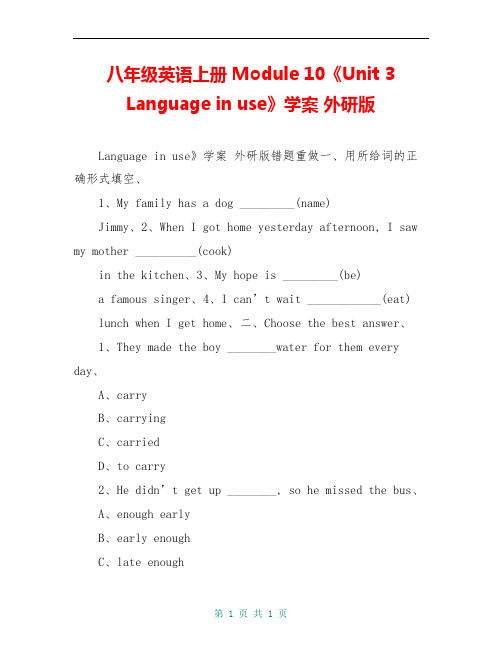
八年级英语上册 Module 10《Unit 3Language in use》学案外研版Language in use》学案外研版错题重做一、用所给词的正确形式填空、1、My family has a dog _________(name)Jimmy、2、When I got home yesterday afternoon, I saw my mother __________(cook)in the kitchen、3、My hope is _________(be)a famous singer、4、I can’t wait ____________(eat)lunch when I get home、二、Choose the best answer、1、They made the boy ________water for them every day、A、carryB、carryingC、carriedD、to carry2、He didn’t get up ________, so he missed the bus、A、enough earlyB、early enoughC、late enoughD、enough late导入一、Learning Aims不定式做宾语She wanted to see some Beijing Opera、My parents offered to take us there、My parents agreed to take us、We decided to stay for two hours、I hope to understand more next time、重点词组:give sb、 sth、 = give sth、 to sb、bring sb、 sth、 = bring sth、 to sb、 lend sb、 sth、 = lend sth、 to sb、hand sb、 sth、 = hand sth、 to sb、show sb、 sth、 = show sth、 to sb、leave sb、 sth、 = leave sth、 to sb、teach sb、 sth、 = teach sth、 to sb、buy sb、 sth、 = buy sth、 to sb、cook sb、 sth、 = cook sth、 for sb、read sb、 sth、 = read sth、 for sb、习题练习1、The box is too heavy for me________、(xx山西)A、 carryingB、 carriesC、 to carry itD、 to carry2、There’s no chair for me ________、A、 to sit atB、 sit inC、 to sitD、 to sit on3、 He ________ goodbye to us, and then got on the bus、A、 toldB、 spokeC、 saidD、 talked4、 All of us found ________ difficult ________、A、 it; work outB、 it; to work it outC、 it was; to work out itD、 it; to work out5、You’re too heavy、You’d better _______ less meat、A、 try to eatB、 to try to eatC、 try eatingD、 to try eating6、 I think physics is very difficult to learn、 Do you _______ me?A、 learn fromB、 get along withC、 agree withD、 agree to7、 Betty read a famous story _______ her parentslast night、 They all had great fun、A、 toB、 aboutC、 ofD、 for根据首字母或汉语提示完成单词1、She wanted to s___________ some Beijing Opera、2、We decided to s___________ for two hours、3、Lao She’s job was to t___________ Chinese to English in London、4、Teahouse asks us to see the teahouse as the c_________ of the neighbourhood、5、Betty’s parents agreed to takeher w_________ them、6、 This is the news about my favourite games, so I read it with great i_________、7、Vicky ___________ (希望)to see her favourite play、8、 Western ___________(剧院)started in Greece, around600 BC、9、 The audience sat on stone __________(座位)to watch the performance、10、 It was all about an old box _____________(装满的)of gold and silver、11、After the war, Wang __________(失去)the teahouse and he dies、12、 I ________(几乎)couldn’t understand his words、英汉词组互译1、take us there ________________6、懂得更多________________2、 one day ________________7、把……带到______________3、take…with ________________8、两杯茶 ________________4、introduce…to…______________9、要求某人干某事__________5、600 BC ________________10、西方剧院________________完成句子1、Sally will lend Allan a magazine to read、(同义句)Sally will lend a magazine ________ ________ to read、2、 She agreed to go shopping with you、(划线提问)3、 Lao She wrote Teahouse 、 He became famous、(合并为一句) Lao She _______ ________ _______ Teahouse、3、昨天汤姆同意帮助玛丽学习英语。
外研版八年级英语上册:Module 10 Unit 3 Language in use 学案
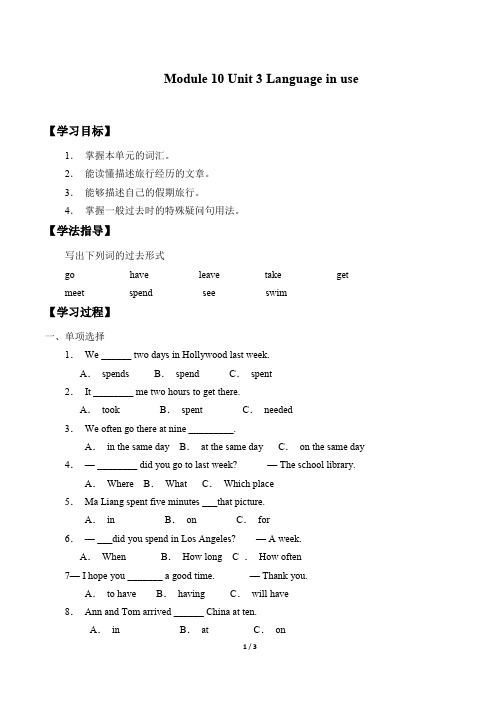
Module 10 Unit 3 Language in use【学习目标】1.掌握本单元的词汇。
2.能读懂描述旅行经历的文章。
3.能够描述自己的假期旅行。
4.掌握一般过去时的特殊疑问句用法。
【学法指导】写出下列词的过去形式go have leave take getmeet spend see swim【学习过程】一、单项选择1.We ______ two days in Hollywood last week.A.spends B.spend C.spent2.It ________ me two hours to get there.A.took B.spent C.needed3.We often go there at nine _________.A.in the same day B.at the same day C.on the same day 4.— ________ did you go to last week? — The school library.A.Where B.What C.Which place5.Ma Liang spent five minutes ___that picture.A.in B.on C.for6.— ___did you spend in Los Angeles? — A week.A.When B.How long C .How often7— I hope you _______ a good time. — Thank you.A.to have B.having C.will have8.Ann and Tom arrived ______ China at ten.A.in B.at C.on9.The traffic accident happened on ___.A. last morningB. Saturday morningC. yesterday10.---I hear the Greens are going to Taiyuan. ----Let’s ________ them.A.say goodbye to B.tell hello to C.say hello to二、句型转换:1.My mother liked the film very much.(就划线部分提问)______ ______ your mother ______the film?2.He didn’t go to school yesterday because he was ill. (就划线部分提问)_______ ________ he go to school yesterday?3.They had some meat and vegetables for lunch yesterday. (就划线部分提问)______ ______ they ______ for lunch yesterday?4.The boy is drawing a beautiful picture at the moment. (用yesterday来改写句子) The boy _________ a beautiful picture __________.5.The little girl picked some flowers in the forest last weekend.(划线提问)____________ The little girl __________ in the forest last weekend?6There were some beautiful flowers 3 years ago. (一般疑问句)__________ There __________ beautiful flowers 3 years ago?7.She read 3 books last week.(划线提问)_____ Books ________ she ________ last week?三、用括号中所给词的正确形式填空1.She went to school without _________ (have) breakfast this morning.2.The girl wanted ____________ (sit) on the chair.3.It’s not easy for her ____________ (play) basketball well.4.They are looking forward to ___________ (have) a long holiday.5.We begin ____________ (have) lessons at 8:00 in the morning.6.He ______________ (return) to Beijing in 3 weeks.7.Please be quiet, the baby _____________ (sleep).8.The old man was very tired and he fell __________ (sleep) very soon.9.There ____________ (be not) a garden in the past.10.She _______________ (not do) his homework last night.。
外研版八年级上册 Module 10 Unit 3 Language in use导学案(新版)外研版
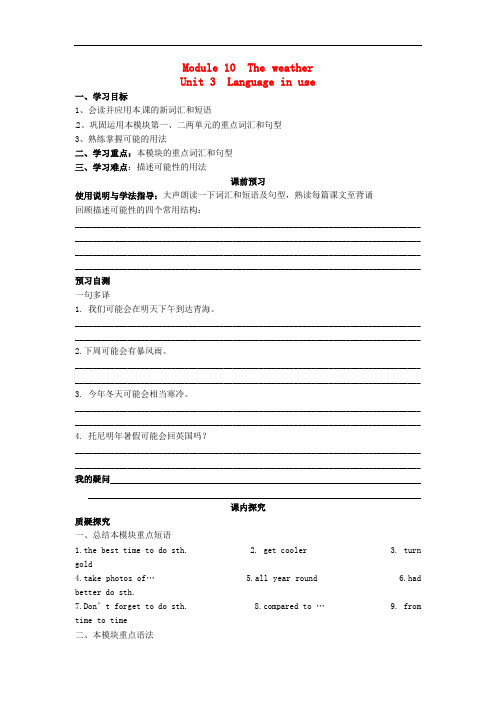
Module 10 The weatherUnit 3 Language in use一、学习目标1、会读并应用本课的新词汇和短语2、巩固运用本模块第一、二两单元的重点词汇和句型3、熟练掌握可能的用法二、学习重点:本模块的重点词汇和句型三、学习难点:描述可能性的用法课前预习使用说明与学法指导:大声朗读一下词汇和短语及句型,熟读每篇课文至背诵回顾描述可能性的四个常用结构:_______________________________________________________________________________ _______________________________________________________________________________ _______________________________________________________________________________ _______________________________________________________________________________ 预习自测一句多译1. 我们可能会在明天下午到达青海。
_______________________________________________________________________________ _______________________________________________________________________________ 2.下周可能会有暴风雨。
_______________________________________________________________________________ _______________________________________________________________________________ 3. 今年冬天可能会相当寒冷。
- 1、下载文档前请自行甄别文档内容的完整性,平台不提供额外的编辑、内容补充、找答案等附加服务。
- 2、"仅部分预览"的文档,不可在线预览部分如存在完整性等问题,可反馈申请退款(可完整预览的文档不适用该条件!)。
- 3、如文档侵犯您的权益,请联系客服反馈,我们会尽快为您处理(人工客服工作时间:9:00-18:30)。
《Module10 Unit3 Language in use》导学案ⅠTeaching modelRevision and applicationⅡTeaching methodFormal and interactive practice, task-based activities.ⅢTeaching aims1. Function: Describing the weather.2. Structure: May, might, probably (for possibility)3. Around the world: The wettest place4. Task: Preparing some advice on the best time to visit ChinaⅣTeaching aidsTape recorder, OHP, handoutsⅤTeaching StepsStep 1 RevisionWeather reportStep 2 Language practice1. Read through the example sentences in the box with the whole class.It might snow.It’s probably sunny and hot there.Bring a map because you may want to travel around.2. Ask the students to repeat the sentences in the box.Step 3 Grammar情态动词本身有一定的词义,为谓语动词增添情态色彩,表示说话人对有关行为或事物的态度和看法,认为其可能、应该或必要等。
我们学习过的can 和may 都属于这类词。
情态动词无人称和数的变化,情态动词后面接的动词需要原形,否定式是在情态动词后面加not,当我们想表达可能发生某事以及可能做某事时,可以用may / might 表示。
例如:It’s cloudy too, so it might snow.也是阴天,所以有可能会下雪。
Bring a map because you may want to travel around.带张地图,因为你可能想四处走走。
There may be a few showers, so bring an umbrella with you.可能会有阵雨,所以随身带把伞吧。
might 与may 没有太大的区别,形式上might 是may 的过去式,但在表示将来的可能情况时,might 表示的可能性比may 表示的可能性还要小。
例如:Take your swimwear because you might want to go swimming in the sea.带上游泳衣吧,说不定你想要到海里游泳呢。
英语中表示可能的方式有许多,除使用情态动词may / might 以外,还可以通过will 以及表示“可能”的形容词和副词表达。
常用的有:It is possible to do sth. .., It is possible that …,主语+will probably / possibly + v.等。
例如:Is it possible to visit Alaska in December?十二月去阿拉斯加游览有可能吗?It is possible that it’ll be snowy in the night.晚上有可能会下雪.It’ll probably be cold and wet天气很可能会又湿又冷。
probably 表示“很可能”,所以表示的可能性要比possible 大。
Step 4 Exercises.1. Ask the students to read through the sentences in Activity 1.2. Complete the sentences with may or probably in Activity 1.1) It __________ be cold and wet in Hong Kong in January.2) Mary will__________ go to New York in the autumn.3) It will ___________ rain tomorrow, so I’ll stay at home and read a book4) You ____________ need to take a scarf with you. It’s cold.5) It ___________ rain later, so take an umbrella with you.6) It will __________ be sunny in Haikou now.3. Ask the students to check with a partner.4. Check the answers:Keys:1. may2. probably3. probably4. may5. may6. probablyStep 5 Work in pairs.2. Ask the students to read through the example with the class.—I usually do my homework in the evening, but I might watch a TV programme this evening.—…3. Work in pairs.Step 6 Complete the sentences.1. Ask the students to read through the sentences in Activity 3.1) It is sunny now, but let’s take an umbrella … (rain later)2) It isn’t always warm in February, and … (cool)3) We’re going to the mountains, and we hope … (snow)4) It’s usually hot and sunny, so we … (swim in the sea)5) Buy a good map because we … (visit the city)2. Ask the students to read through the example with the class.The weather is usually warm during the day, but bring a sweater …(cold in the evening)The weather is usually warm during the day, but bring a sweater because it may be cold in the evening.3 Complete the sentences. Use may, might or probably where necessary.4. Ask the students to check with a partner.5. Check the answers:Keys:1 It’s sunny now, but let’s take an umbrella because it will probably rain later.2 It isn’t always warm in February, and it may be cool.3. We’re going to the mountains, and we hope it will probably snow.4. It’s usually hot and sunny, so we might swim in the sea.5. Buy a good map because we might visit the city.Step 7 Complete the sentences.1. Ask the students to read through the sentences in Activity 4.1) Th ere’re a lot of __________. It’s cloudy.2) The weather is snowy and there’s a lot of ____________ in the park.3) The sun is out. It’s very ____________ and hot today.4) The wind is very strong. It’s so __________ that it’s difficult to walk. 2. Ask the students to read through the example with the class.It rains a lot in summer in Beijing. It’s often rainy.5. Check the answers:Keys: 1. cloud 2. snow 3. sunny 4. windyStep 8 Listening practice.Ask the students to read through the sentences in Activity 5 individually.1) In December, it often _____________ in New York.2) My grandparents wear warm clothes because it is very ____________.3) The summers are very ____________.4) In July the temperature is often over ____________ degrees.5) December is the middle of _____________ in Sydney.6) In December, we go to the ____________ because it’s very hot and sunny.7) In April, May and June, it often ____________.8) The temperature in winter is about ______________ degrees.2. Play the tape.3. Listen and choose the correct answer.4. Ask the students to check with a partner.5. Check the answers:Step 9 Work in pairs.1. Ask the students to look at the world weather map in Activity 6 carefully.2. Work in pairs.3. Ask and answer the questions.1) What’s the weather like in Beijing?2) What’s the temperature in London?3) Is it raini ng in Cape Town?4) Which city has the coldest weather?5) What’s the weather like in New York?6) Which city has the highest temperature?4. Ask the students to check with a partner.5. Check the answers:Keys: 1. It’s rainy. 2. It’s between five and eight degrees.3. No, it isn’t. It’s sunny.4. Moscow has coldest weather.5. It’s windy.6. Sydney has the highest temperature.Step 10 Complete the passage.1. Ask the students to look at the weather table in Activity 72. Ask the students to read through the passage in Activity 7.This morning in the north, it will be windy and there may be some (1)_________ in the mountains in the afternoon. In the sout h, it will be (2)_________ and in the afternoon it will become (3)_________. In the east, it will be (4)_________ and hot in the morning but there might be some (5)_________ in the afternoon. In the west, it will be (6)_________ in the morning, but the sun will come out in the afternoon.3. Ask the students to check with a partner.4. Check the answ ers:Keys: 1. snow 2. cloudy 3. windy 4. sunny 5. rain 6. cloudStep 11 Around the world: The Amazon Rainfore st1. Ask the students to look at the picture and discuss what they can see.2. Read through the information with the whole class.3. Talk something about “The Amazon Rainforest”.4. Read and fill in the blanks.Step 12 Module task: Preparing some advice on the best time to visit China.1. Ask the students to read the email in Activity 8.2. Ask the students to read through Ms Wang’s questions1) When is the best time to come?2) What might the weather be like?3) What clothes should I bring?4) Where can I stay?5) What can I do?3. Find answers to Ms Wang’s questions.4. Ask the students to check with a partner.5. Check the answers:Keys:Step 13 达标练习A. 单词拼写1. —What’s the t__________ today?—It’s very warm. It’s 10~15℃.2. — Have you seen Li Lei?— Yes, I have. He is p__________ in the library.3. The ground is very wet. It must have r_______ last night.4. There are often s_______ in summer in Guangdong.5. There are many c_______ in the sky. It’s going to rain.6. The weather here is t_________! It often snows heavily in winter.7. Remember take an u_________, it might rain.8. Sanya is usually very hot and sunny c__________ to other cities.Keys: 1. temperature 2. probably 3. rained 4. showers5. clouds6. terrible7. umbrella8. comparedB. 完成句子1. 南方时不时下大雨。
